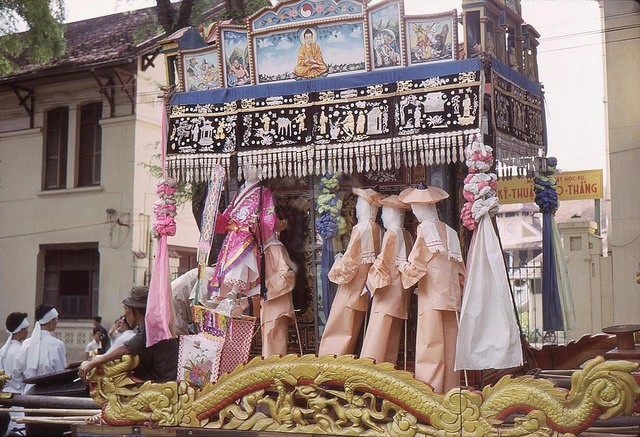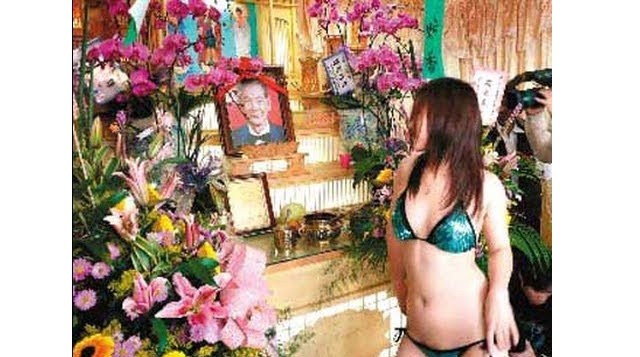Attending a funeral can be a very solemn occasion… but China is seeing more and more services featuring the services of an unlikely kind: professional strippers!
Last rites vary around the world with different cultures choosing to honor their dead in various ways. From the somber traditions that originated in Victorian England that now dominate burials in the UK to the upbeat dancing commonly seen at New Orleans jazz funerals, the world celebrates and commemorates death in different ways.
However, it is the bizarre and unique craze of funeral strippers that has come to recent media attention in, of all places, China! A country known for its conservatism when it comes to sex and nudity…
Funeral Strippers: Where Did The Craze Come From?
Professional mourners are not a new thing and there has long been a tradition in China and other parts of Asia for employing actors to attend funerals.
Their services are to help the family set the right mood for the occasion and to bulk up the numbers attending the last rites of their loved ones.

Known as moirologists, these actors are paid to grieve in a public way that is hoped to encourage others to do the same. A demonstrative outpouring is seen as a way both to honor the deceased with a big send off and to ‘fire up’ the spirits.
In countries like Taiwan, professional mourners can earn big money though the call for the more traditional actors who simply cry has been receding in recent years.
The practice is though to have originated from Egypt and is not, it itself, that bizarre.
But stripping? Where did this come from?
There are several schools of thought around this.
The first is one of pure supply and demand. Asian families want funerals to be as well-attended as possible to show respect to their dead and nothing draws a crowd more than the promise of a party. In rural communities in Mainland China, this is not a revelation and the inclusion of dancers and singers has been common for many decades. Some troupes of professional performers can earn as much as $300 to $400 per funeral.

Typically, they will provide a festive performance which can include fireworks, electric flower carts, neon lights and music broadcast over loud sound systems. However, there has been a rise in the number of funerals where dancers will also be paid to remove their bras and underwear, sometimes climbing poles and dancing erotically.
There is no doubt that for some, the site of a naked pole-dancer at a funeral could be quite upsetting but this controversial practice is being hailed by many as an excellent way to boost funeral numbers.
The evolution of funeral performances including strippers is thought to have started in the late 1990s in Taiwan.
At this time, the Taiwanese mafia first took control of the funeral industries and began offering strippers from their own clubs to perform at services. Known as ‘funeral rascals’, these gangsters have made the business a lucrative one for themselves by muscling in on all aspects of the last rites; from transporting the body to the supply of coffins and providing the entertainment, it is in these gang’s interests to make funerals as ‘showy’ and large as possible.
In Taiwan, prominent members of a community can be seen to have funeral processions that stretch for several miles with hundreds of cars and a huge number of professional mourners.
The spread of this kind of practice to China is unsurprising and though similarly sizes public displays are not common, the use of strippers does seem to have originated in rural areas of China where the cultural influence of Taiwan is greatest. In August 2006, for example, five women were arrested for performing a striptease and dancing naked at the funeral of a farmer in the Jiangsu Province in the east of China.
Another theory is that rural households in China are thought to use funerals as a way of expressing their wealth and that paying out for large funerals with extravagant entertainment is an opportunity to ‘splash the cash’.
There is also some evidence to suggest that the strippers may be a form of worship. Huang Jianxing, a professor at Fujian Normal University, was quoted by the BBC News as saying such a ritual could be a way of blessing the deceased with ‘many children’.
In rural parts of the country, there are many fertility worship traditions that are seen as unusual by those in the cites but nevertheless hold great significance in local communities.
How is the Chinese Government Clamping Down?
However the rites started and evolved, the Chinese government is keen to put a stop to the practice of ‘obscene, pornographic and vulgar performances’ at funerals.
Yet, despite clampdowns by the government Jiangsu province returned to the headlines in 2015 when strippers were arrested having danced ‘passionately’ at a funeral before performing a strip tease act.
Following another high-profile incident in Hebei Province, Beijing finally outlawed the practice the same year and gave police the authority to break up funerals that involved stripteases; a belts and braces approach as stripping is actually illegal in the country anyway.
The Chinese authorities have vowed to put an end to the practice of erotic entertainment at funerals and have since been arresting and punishing those who are involved.
Condemned as an ‘uncivilized’ habit, the Culture Ministry were quoted by the Xinhua News Agency as saying:
“Having exotic performances of this nature at funerals highlights the trappings of modern life in China, whereby vanity and snobbery prevail over traditions.”

The ministry has announced that it will ‘severely punish’ anyone who hires strippers to perform at funerals and has a set up a new campaign to police events.
Focusing initially in the provinces of Jiangsu, Hebei, Henan and Anhui, the government has also set up a hotline for members of the public to report ‘funeral misdeeds’.
Whether the Chinese government will be able to eradicate the craze of stripping at funerals is yet to be seen.
Certainly their ban on pornography has not been terribly successful.
But we will leave you with the words of Canadian-Italian actor, Nick Mancuso:
“Death and sex are the dominant reality of our day”.
Perhaps the Chinese are just ahead of their time with this one?

